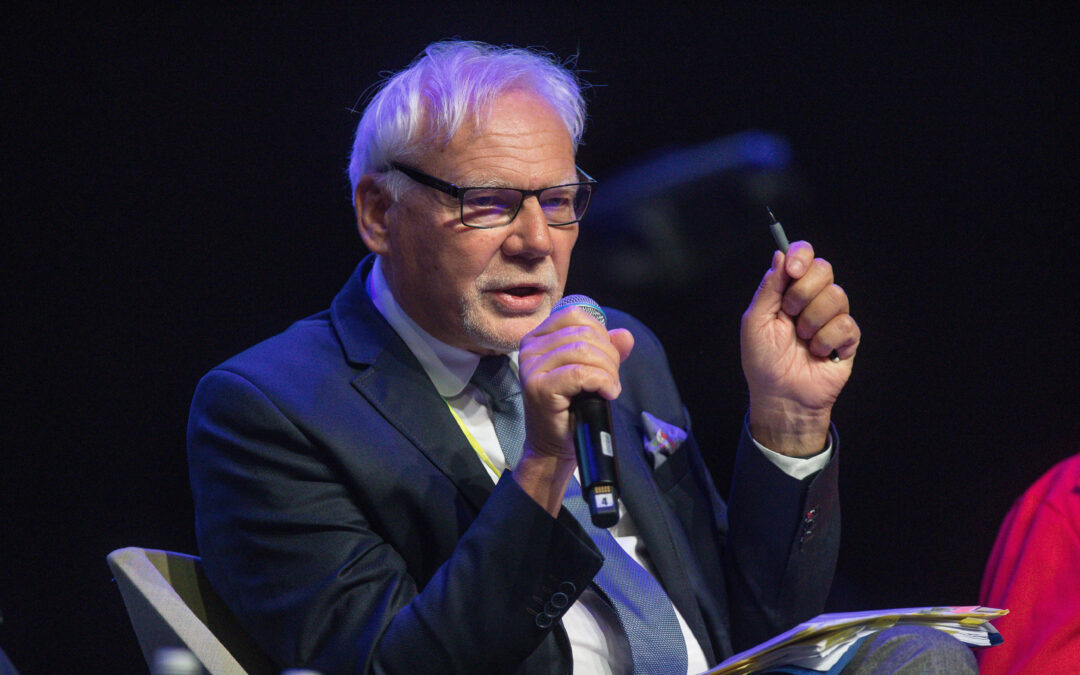A group of 26 judges formerly serving in Poland’s Constitutional Tribunal has issued a letter calling for the prosecutor’s office to take “decisive” action against the “slander” of Marek Safjan, a Polish judge in the Court of Justice of the European Union (CJEU).
Safjan has become the subject of criticism in right-wing media after he last week presented the findings of the CJEU which delivered a blow to the government’s flagship judicial overhaul.
Earlier this month, the CJEU ruled in a case brought against Warsaw by the European Commission that the new system for disciplining judges in Poland is in violation of European law. The European court told Polish officials to “rectify the situation…without delay” or otherwise face financial penalties.
Pro-government and right-wing newspaper Gazeta Polska ran a cover story today about Safjan’s father, Zbigniew Safjan, whom it described as “a Nazi border guard” and collaborator for the Soviet military police. The cover featured a photograph of the judge along with two men in Nazi uniform.
Safjan has called the cover story “nasty” and “humiliating” as well as “an act from the depths of the communist era”. The judge said he is considering filing a civil action suit for the protection of personal rights.
He told Onet that he had not lived with his father since the age of three, nor had he himself ever belonged to any youth group or party. “And yet, the stereotype of the ‘Commie Jew’ is still used against me,” he said.
Czytamy, czytamy, czytamy.#GazetaPolska https://t.co/0vCRn0TRlv .@GPtygodnik
Najnowszy Nr 30 z 28 lipca 2021 https://t.co/al5uL5MWPXhttps://t.co/E5ZgMBc5w1 pic.twitter.com/Cf3bnNgIvm— Jacek Klim #DUDA2020🇵🇱✌️🇵🇱 #SzczepimySię (@jacekbea) July 27, 2021
“The situation of my father was unique. His father, my grandfather…was a person with documented Jewish ancestry,” Safjan explained in quotes carried by Onet. “During the war, my grandfather received an ultimatum from the Germans: either his son joined a sanitary formation working with the Grenzschutz…or he would be sent to a camp with his father. Both would die.”
“It is terribly shameful that I have to describe the wartime trauma of my father, who was forced to flee with my grandfather, because their neighbours kindly informed the arriving Germans that they were a Jewish family,” he added.
The cover, which was already advertised earlier this week, has also prompted a concerned response from 26 retired judges from Poland’s Constitutional Tribunal, which was headed by Safjan between 1998 and 2006.
The judges argued that there are no personal or professional blemishes on Safjan’s career, resulting in “attempts to humiliate him with the use of falsehoods from his father’s life”.
“In the face of such a brutal and groundless attack, no one should be indifferent,” they wrote. “This extremely perfidious, lying act of hatred…must be strongly condemned.”
The letter called on the prosecutor’s office to “take immediate, effective steps to prevent spreading defamatory content” and to “punish the guilty”. The judges also asked academics – especially from the University of Warsaw, where Safjan has worked as a law professor – to “join the protest” and for politicians to “prevent him from being slandered by the media”.
Main image credit: Tomasz Stańczak/Agencja Gazeta

Maria Wilczek is deputy editor of Notes from Poland. She is a regular writer for The Times, The Economist and Al Jazeera English, and has also featured in Foreign Policy, Politico Europe, The Spectator and Gazeta Wyborcza.




















